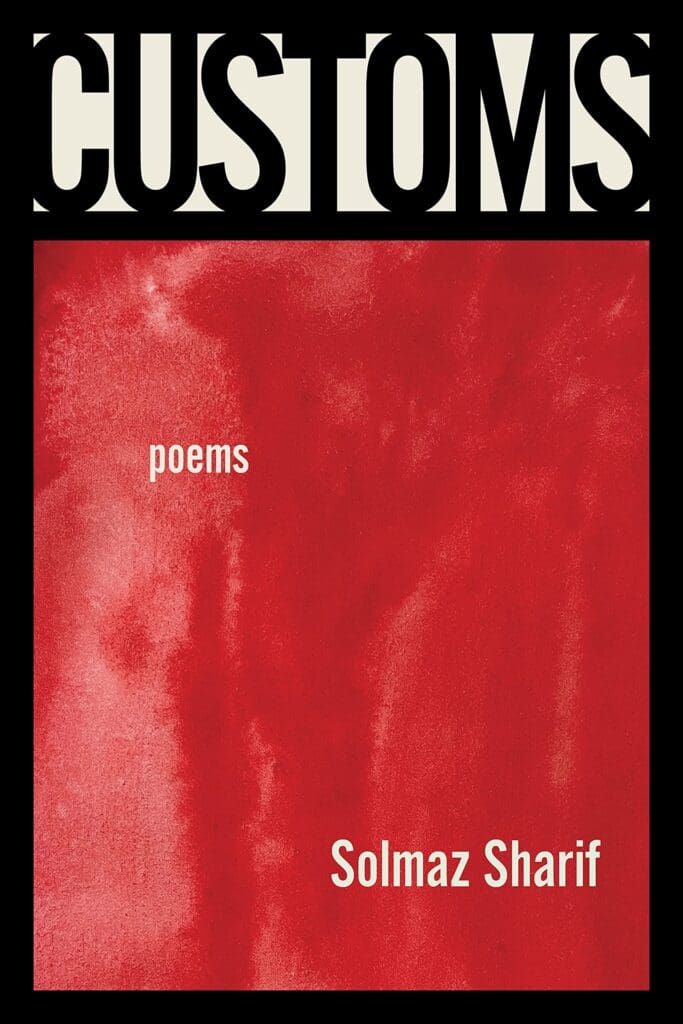Solmaz Sharif’s second collection of poetry, Customs (104 pages; Graywolf Press), interrogates the English language and its role in shaping America. English was the language used to write the U.S. Constitution, enslave kidnapped West Africans, and free enslaved African Americans; it’s the language used to go to war and used to achieve liberation. Customs inspects language itself as a device for colonization and country-making, which in this land is the same.
The collection, split into three sections, begins with a poem called “America.” Eighteen lines composed of 12 sentences, each sentence three words long, the poem appears almost like a palindrome, beginning in the same way it ends with the words “I had to.” We’re left wondering, what has to be done? And who must do it?
Sharif, born in Istanbul to Iranian refugees who immigrated to the United States when she was an infant, searches for heritage and her parents’ mother tongue, Farsi, in these poems. They illustrate the sense of belonging one must develop to themselves, to art, and to the pursuit of liberation, especially if one thinks they cannot truly belong to the country in which they live.
Regularly referred to as a “political” poet, Sharif makes clear her political and poetical influences in these poems, which deal in freeform, syllabic, and epistolary structures. June Jordan, a foundational influence of Sharif’s, as well as Audre Lorde and Gwendolyn Brooks, emerge from the pages. Take “The Master’s House,” for instance, in which she writes, “To disrobe when the agent asks you to / To find a spot on any wall to stare into / To develop the ability to leave an entire nation thusly, just by staring at a spot on the wall, as the lead-vested agent names article by article what to remove.”
The poem operates on multiple levels. Rhetorically, the repetition and double meaning of the word “article” denotes both items of clothing as well as articles of law, arguing that the speaker’s nonconsensual undressing is part of the state’s work of keeping citizens safe. The speaker must reveal themselves to prove their body is not hiding weapons, yet their body is also seen as a weapon.
The poem also draws on Audre Lorde’s The Master’s Tools Will Never Dismantle the Master’s House. Lorde’s work, now a canonical text in African American and Feminist studies, argues that liberation will not be wrought by the same means that built oppression. Each line of the poem starts with the word “To,” illustrating how too much time spent in America, while holding political ambitions that contradict Americanness, can precipitate the disappearing of oneself. “To know no nation will be home until one does / To do this in order to do the other thing, the wild thing, though you’ve forgotten what it was,” Sharif writes.
At times, Sharif is the speaker in her poems, retelling with clarity and cunning the relationship between agents of the state and subjects of state surveillance. In “He, Too,” Sharif writes, “I hate poetry, the officer says, / I only like writing / where you can make an argument. / Anything he asks, I must answer. / This, too, he likes. / I don’t tell him / he will be in a poem / where the argument will be / anti-American.”
Customs includes three poems by the same name, “Dear Aleph.” They’re written to an imagined detainee held at Guantanamo Bay, the U.S. Navy base located in Cuba. Those held there, often men of Iraqi and Afghan descent, are deprived of Constitutional rights of due process otherwise afforded to those residing in United States territories. The first of the three poems begins, “Like Ovid: I’ll have no last words.”
Language conciliates power, just as power confirms language. In “Social Skills Training,” Sharif writes, “Studies suggest How may I help you officer? Is the single most disarming thing to say and not What’s the problem? Studies suggest it’s best the help reply My pleasure and not No problem. Studies suggest it’s best not to mention problem in front of power even to say there is none.”
Part of what a settler-colonial nation state demands of its people to maintain order, function, complicity, and compliance are certain forms of speech that are deferential to power and dismissive of one’s needs. We do this regularly and fluently in America, where police kill Black people over the course of a traffic stop. Participating in this form of language is integral to saving one’s life, but it’s a trap, Sharif seems to say, negating one’s power.

